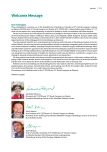-
Články
- Časopisy
- Kurzy
- Témy
- Kongresy
- Videa
- Podcasty
SEČANSKÝ INAUGURAL LECTURE
Published in the journal: Vnitř Lék 2017; 63(Supplementum2): 11
Category: 6<sup>th</sup> CECON | Oral Presentations
1. Monogenic diabetes and obesity in Slovakia
Klimes I, Stanik J, Gasperikova D
Institute of Experimental Endocrinology, Biomedical Research Center, Slovak Academy of Sciences, Bratislava, Slovakia
Diabetes mellitus (DM) and obesity is generally a polygenic disease, but with the increasing progress of molecular biology there are identified more and more cases caused by a defect in a single gene. Until now we know several tens of genes whose mutations are responsible for monogenic diabetes (MDM) and obesity. The main goal of our study was to implement DNA testing of monogenic diabetes and obesity in Slovakia, with a focus on Ad 1. Identification of the prevalence and mutation spectrum of the most common genes responsible for MDM and obesity, Ad 2. Contribution to the knowledge of molecular-biological mechanisms of action of selected mutations and Ad 3. Verification of the applicability of the new clinical biomarkers for the differentiation of individual diabetes subtypes and Ad 4. Definition and adoption of genetic diagnostic criteria of monogenic diabetes. Since 2004, we have received in our Laboratory more than 1 000 patients with clinical suspicion for monogenic diabetes and more than 500 patients with clinical suspicion on monogenic obesity. Individual probands were analyzed for relevant genes according to their clinical phenotype. The establishment of a DNA banks of monogenic diabetes and obesity has led the following interesting results. Ad 1. On the basis of the information from the National registry of childhood diabetes, established since 1981, we identified for the first time the exact prevalence of permanent neonatal diabetes (PND). We have found that the prevalence of PND in Slovakia is 4 times higher than it was previously reported; we have identified the minimum prevalence of GCK-MODY and HNF1A-MODY and moreover we have identified 1.2 % prevalence of de novo mutations in the most common genes causing MODY diabetes in the so far the largest study counting 922 patients from Slovak and Czech MODY register; we have identified the minimum prevalence of MC4R mutation carriers in Slovakia; Ad 2. We have functionally characterized the molecular mechanisms of the 10 novel mutations in the glucokinase gene and the novel promotor mutations of the HNF4A gene; we have shown the digenic cause of combined clinical phenotype (insulin resistance and growth retardation), which arises from the heterozygote disruption of genes for insulin receptor and beta-2 chimerin; we have functionally characterized novel mutation in EIF2S3 gene responsible for syndromic form of obesity. Ad 3. We have confirmed the usability of hsCRP as a clinically easily available biomarker for the differentiation of HNF1A-MODY diabetes from type 2 diabetes in the different European population; moreover, we have verified the changes in the glycan profile in the plasma of individuals with the mutation in the HNF1A gene, the specific DG9-glycan index is a usable marker in the resolution of the patients with HNF1A-MODY from patients not only with type 2 diabetes, but also from patients with type 1 diabetes; Ad 4. On the basis of our results, we were invited to the formation of molecular-genetic diagnostic guidelines for diabetes type MODY in Europe, which we have then, after the auspices of the Slovak Diabetes Association, implemented in Slovakia. In this way we have completed the effort in our Laboratory to fulfill the idea of medicine based on genetic makeup, which is a matter for all sectors of the medicine, including metabolic disorders.
Štítky
Diabetológia Endokrinológia Interné lekárstvo
Článek CHILDHOOD OBESITY I.Článek Welcome MessageČlánek OBESITY AND TYPE 2 DIABETESČlánek TOP 9 E-POSTERSČlánek CO-MORBIDITIES OF OBESITY
Článok vyšiel v časopiseVnitřní lékařství
Najčítanejšie tento týždeň
2017 Číslo Supplementum2- Parazitičtí červi v terapii Crohnovy choroby a dalších zánětlivých autoimunitních onemocnění
- Rizikové období v léčbě růstovým hormonem: přechod mladých pacientů k lékařům pro dospělé
- Nech brouka žít… Ať žije astma!
- Intermitentní hladovění v prevenci a léčbě chorob
- Monoklonální protilátky v léčbě hyperlipidemií
-
Všetky články tohto čísla
- SEČANSKÝ INAUGURAL LECTURE
- OBESITY EPIDEMICS – PROBLEM OF CENTRAL EUROPE
- BARIATRIC/METABOLIC SURGERY I.
- PHYSICAL ACTIVITY IN THE TREATMENT OF OBESITY, DIABETES, AND OTHER COMORBIDITIES
- CO-MORBIDITIES OF OBESITY
- ROLE OF SGLT-2 INHIBITORS IN THE TREATMENT OF DIABETIC PATIENTS
- CHILDHOOD OBESITY I.
- ADIPOSE TISSUE, THERMOGENIC AND METABOLIC ORGAN
- Welcome Message
- GENETICS OF OBESITY AND DIABETES
- MANAGEMENT OF OBESITY AND ITS COMORBIDITIES
- OBESITY AND TYPE 2 DIABETES
- NUTRITION, COGNITIVE-BEHAVIORAL THERAPY
- BARIATRIC/METABOLIC SURGERY II.
- TOP 9 E-POSTERS
- GUIDED E-POSTER PRESENTATIONS
- UNMODERATED (DISPLAYED) E-POSTER PRESENTATIONS
- Vnitřní lékařství
- Archív čísel
- Aktuálne číslo
- Iba online
- Informácie o časopise
Najčítanejšie v tomto čísle- GUIDED E-POSTER PRESENTATIONS
- MANAGEMENT OF OBESITY AND ITS COMORBIDITIES
- UNMODERATED (DISPLAYED) E-POSTER PRESENTATIONS
- TOP 9 E-POSTERS
Prihlásenie#ADS_BOTTOM_SCRIPTS#Zabudnuté hesloZadajte e-mailovú adresu, s ktorou ste vytvárali účet. Budú Vám na ňu zasielané informácie k nastaveniu nového hesla.
- Časopisy



